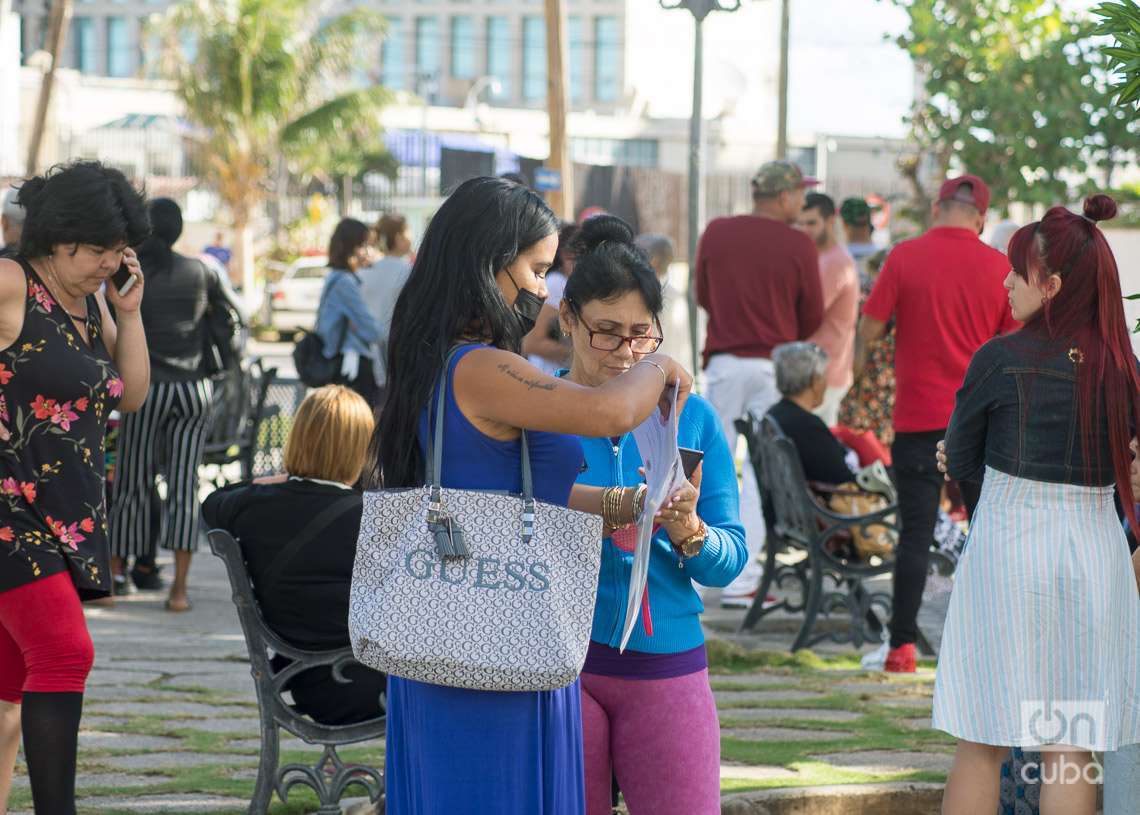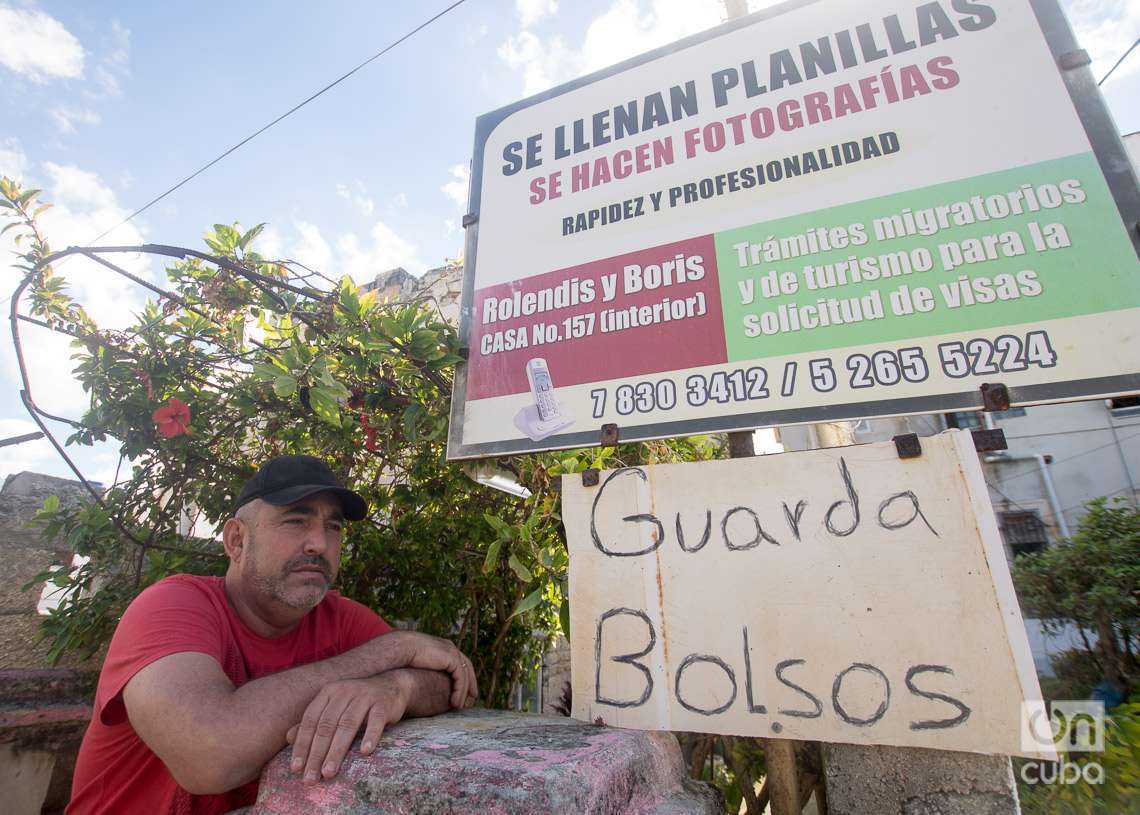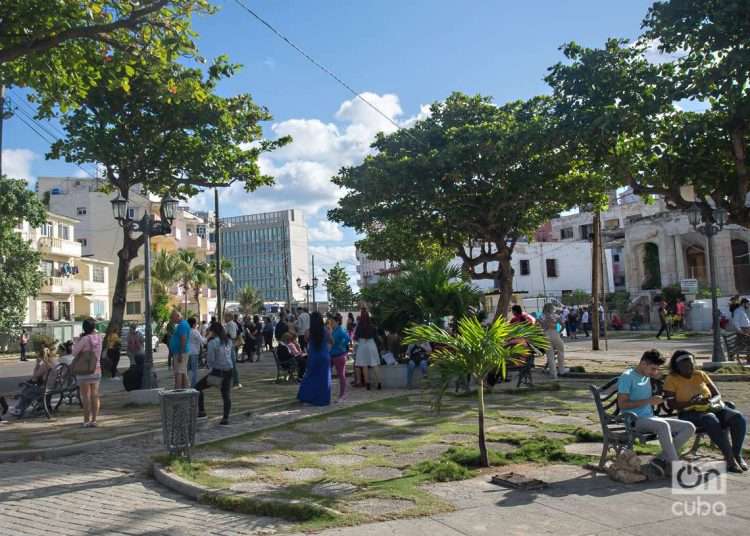Five years ago, silence and inactivity unexpectedly took over the Parque de los Suspiros (Park of Sighs). The until then crowded Vedado site, located in front of the Calzada y K funeral home and a few meters from the U.S. embassy in Havana, suffered the disastrous blow of the closure of almost all U.S. consular services on the island. The drastic measure was taken by the Donald Trump administration under the pretext of alleged sonic attacks against its diplomats. The numerous people present at the park disappeared from one day to the next.
Since then, at the end of 2017, Cubans who wished to travel legally to the United States, to emigrate or visit, for study or another reason, had to carry out their procedures outside of Cuba — with Colombia first and Guyana later as the main base of operations for the immigrant visas — and with the consequent impact on pockets and mental health.
Therefore, they stopped meeting in the soulless Havana park to wait their turn for an interview, the delivery of documents or the collection of the passport with the stamped visa, as had happened there for a long time.
It was only in May 2022, more than a year after Biden assumed the presidency, that some visas began to be processed in the Cuban capital. The service increased in the following months, including applications for the family reunification program, also suspended by Trump.
Finally, after two rounds of dialogue between authorities from both countries and in the midst of a massive wave of Cuban migration to the United States, both by land and by sea, the U.S. government announced in September the total resumption of visa procedures for immigrants in Cuba as of January.
The step has brought closure to the annoying and unpopular chapter of Guyana and has returned the movement to the Parque de los Suspiros, even if non-immigrant visas, with few exceptions, remain out of the equation.
U.S. Embassy in Cuba reactivates Family Reunification Parole Program
The park
A week after the large-scale reopening of consular services in Havana, the small triangular-shaped park and its surroundings exhibit a livelier face than months ago. It may not be what it once was; but it is very different from the silence and loneliness of the years that followed Trump’s decision.
More than a hundred people are in the place. Many standing, others, sitting on a bench, in a doorway, or on the sidewalk. Some are alone; most, in small groups or in pairs. There are people of all ages, from the elderly to some teenagers and children with their mothers. Several wear masks; most don’t. Many, in addition to bags, carry a file full of papers. Most wait in silence or talk quietly, or talk on the phone, or check the Internet on their cell phones. There is no bustle or visible emotions, and there is a lot of contained drama, restrained hope, expectation.
Two or three police officers stand strategically on the corners, as mere spectators. In addition, there are cars parked nearby and a street vendor of pastries and soft drinks making a lot of money. Across from the park, the funeral home keeps its bathroom open for those who need it while they wait. “Give me what you can,” says the doorman when someone asks him for the price.
Suddenly, the apparent tranquility is disrupted and many of those who are waiting crowd around an official who arrives with a list in hand and begins to call those who have appointments scheduled at that time. When she finishes, some ask her questions, try to clarify doubts, show her documents.
Then, those named follow the official towards the embassy, to the appointments that will decide their future. The rest either go back to their posts or remain murmuring and following with their eyes those walking away. The scene is repeated periodically from early in the morning.

But not everyone shows up for an appointment or expects to deliver a document. Others, like Xiomara, belong to the group of the luckiest: those who received the notification to collect their passports with the stamped visa and stay away from the morning calls of the official; although in the park they mix with the rest.
The long-awaited procedure begins at 1:00 in the afternoon, but not a few arrive in the morning and make their own queue, even when they are officially summoned for a specific time. Everyone wants to get out of there as soon as possible and unleash their happiness after being in this trance for so long.
That’s what Xiomara tells me. She, like the others in her situation, seems to be counting the minutes. She does not hide her joy and assures that she still does not believe that “all this is finally going to end, thank God,” although, at the same time, she is somewhat annoyed with the visa delay.
“It is true that he who waits a lot, waits a bit longer, and that after waiting so long, a month is nothing; but after they tell you that it’s finally your turn, what you want is for everything to be fast,” says the woman, who tells me that she had her interview on December 9 and the medical check-up on the 14th, although it wasn’t until now, a month later, that the immigrant visa will finally be in your hands.
“I can’t wait to be with my daughter and my grandchildren,” says Xiomara. She tells me that she has been waiting for that moment since before the pandemic and assures that she never considered the option of arriving in the United States illegally, because she always trusted that “with Biden” she would be able to resume her immigration process.
“If I would have had to go to Guyana, I would have gone; but thank God, everything happened for me here in Havana and my daughter was able to save money, although it is not that things are cheap here,” says the 67-year-old woman from Havana who points out the medical check-up — which is carried out at the Manuel Fajardo Hospital —, as the main reason responsible for the final delay of her trip: “And that costs 33,600 pesos.”
Yes, but…
Xiomara’s visa will go to the 2023 numbers, after the previous year, for the first time since 2017, the United States government complied with the agreement to deliver a minimum of 20,000 visas per year to the island’s citizens.
Maikel’s parents aspire to increase this year’s figure. He traveled with them from Camagüey to accompany them to their interview and was waiting for them in front of the Parque de los Suspiros when OnCuba visited the place.
In their case, the process has been faster. Just eight months ago his brother “claimed” his parents from Miami after becoming a citizen, the 24-year-old explained to me. After the interview, the three plan to return to Camagüey and return to the Cuban capital at the end of the month, the date on which it is their turn for the medical check-up. “This is what is taking the longest,” he confirms what Xiomara said, “and staying in Havana all the time is much more expensive than going home and then coming back.”
According to Maikel — who does not plan to leave Cuba “yet” —, in just five days in Havana he and his parents had spent more than 50,000 pesos between rent, food and transportation, not counting another 6,000 for the trip from their province to the capital and much more they will surely have to pay for the return, plus the cost of the medical check-up they have an appointment for.
“Only the rent costs us 2,000 pesos a night, and for keeping your bag here they charge you up to 200. The price of the car to come to the appointment, I better not tell you. Imagine if we stay until the end of the month how much it will cost us, or actually my brother, who is the one who sends the money for all this,” he reflects. However, he admits with some relief that “it is true that going to Guyana would be more expensive.”
The case of Maikel and his parents is not exclusive. Among those waiting for their appointment or to collect the visa there are also people from Matanzas, Cienfuegos, Sancti Spíritus and Holguín, among other provinces, “and the further to the east, the worse, because traveling from there is more difficult and more expensive,” the young man says.
That is why he affirms that the new migration program of the Biden administration for Cubans and citizens of three other countries seems a “good” thing to him, “because everything is done digitally, without so many trips to Havana; although not everyone will be able to do it. Anyone over there can’t be your sponsor.” And he personally would prefer to go to the United States with “a visa that guarantees aid and residence.”

Another who celebrates the resumption of consular services in Cuba, although also with dissatisfaction, is Boris. Unlike most of those who attend the Parque de los Suspiros, he does not wait for a visa or accompany a family member. Twelve years ago, Boris Luis Zubizarreta has been the owner of one of the businesses in the area dedicated to filling out forms, taking photos, printing documents and storing the bags of those who must enter the diplomatic headquarters.
For him, who says he has seen “all the changes” in the United States consular services in Havana, the last five years have been “very hard” for his business. And although now “things have been taking a turn,” the revival of the park is still not enough for his own economy. “To tell you the truth,” he says, “we are surviving with the bags, although something is better than nothing.”
He says that before the consulate closed in 2017, his main source of income was filling out the necessary forms for “visits” and other non-immigrant visas. “But they still don’t give them here in Havana, except in exceptional cases. We are going to see if this year Biden also opens that door and helps us,” he added.
The man explains to me that the documentation for immigrant visas and family reunification is processed mainly electronically and that gives him “less margin” in his work. However, he clarifies that he also fills out digital forms, makes appointments and does other procedures online, even for embassies of other countries.

Actually, more than a self-employed person, Boris resembles a consultant. Standing at the entrance to his house, while an employee — also jovial and well-informed — sees to the bag business, answers questions, clears up concerns, and offers advice. As we talk, several people approach him from the park and question him about interview appointments and student visas as well as ESTA visas and medical cases. Even about the application for the new immigration program announced by the Biden administration.
None of those people, at least for the moment, end up becoming his customers; but Boris doesn’t seem upset about it. “Maybe another day they need to do something and come to me,” he tells me. “In addition, the aid is not charged.”
On my way out, I take a final look at the park, which is experiencing a moment of tranquility after the recent visit by the consulate official. Although in each cycle several people enter the embassy for their procedures, the number of those who wait outside seems unalterable. The landscape, with the police officers, the parked cars and the pastry vendor, is practically the same as an hour ago; although with the advance of the day the shadows have been shrinking; the sun rays are felt more strongly. And there’s still a while to noon.
On a corner, I see Maikel and his parents, and I approach them. “Everything is fine,” the same young man answers, “but a piece of paper was missing, my brother’s birth certificate here in Cuba, and now we have to go out and solve it to present it as quickly as possible. They say you can get it right here in Havana, giving money, you know. The important thing is that we are already in this, and we must continue. It’s what it takes for my parents to be with my brother and have a better life there in the United States. Because as things are now in Cuba….”
















